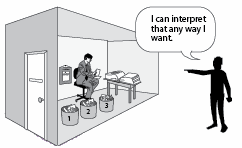Imagine that syntax is sufficient for semantics, and that there is some Chinese thinking going on in the Chinese room as the man shuffles symbols. What makes the syntactical manipulations give off a specifically Chinese semantics? Different people could interpret the symbols so they would give off other semantics. The man shuffling the symbols could see them as a chess game, a second person looking through the window could see them as stock market predictions, and so on.

John Searle, 1990b